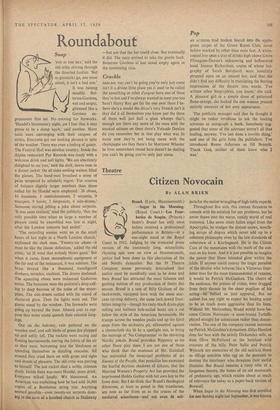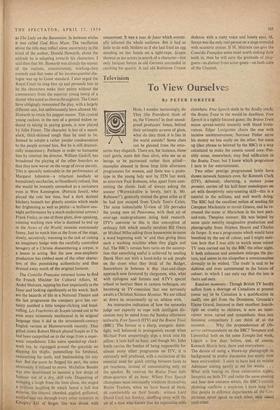Theatre
Citizen Novocain
By ALAN BRIEN Brand. (Lyric, Hammersmith.) —Sugar in the Morning.
(Royal Court.)—Les Four- beries de Scapin. (Princes.) IBSEN'S Brand has only once before received a professional performance in Britain—at a one-night stand at the Royal Court in 1912. Judging by the truncated prose version of the immensely long, octosyllabic rhyming epic now on view at Hammersmith, justice had been done to this aberration of the old Nordic dynamiter. But the 59 Theatre Company seems perversely determined that justice must be manifestly seen to be done and their Brand has attracted the most fulsome and gushing notices of any production of theirs this season. Brand is a sorit of Billy Graham of the backwoods, equipped here with the same stac- cato rat-trap delivery, the same lock-jawed frost- bitten integrity—though his rusty-black drain-pipe suiting and bulbous hob-nailed boots are a cut below the style of the American Savonarola. He tramps across the wooden peaks and up the fjord steps from the orchestra pit, silhouetted against a cheesecloth sky lit by a spotlight sun, to bring the message of 'No Compromise' to the shivering Nordic yokels. Brand provokes flippancy as no other Ibsen play does. I am not one of those who think that the existence of Mr. Gaitskell has outmoded the municipal problems of An Enemy of the People, that penicillin has exorcised the fearful daytime shadows of Ghosts, that the Married Women's Property Act has provided the imprisoned Hedda Gabler with her own key to the front door. But I do think that Brand's theological dilemmas, at least as posed in this translation, are now as far from us as the cruces of the mediaeval, schoolman—and not even fit sub- jects for the senior wrangling of high-table experts.
Throughout five acts, this iceman threatens to cometh with his solution for our problems, but he never thaws into the warm, untidy world of real existence. Like some crazy fallen angel from the Apocrypha, he trudges the distant snows, mouth- ing scraps of dogma which never add up to a coherent philosophy even by the low standards of coherence of a Kierkegaard. He is the Citizen Cain of the mountains with the mark of the out- cast on his brow. And it is just possible to imagine the power that Ibsen intended glow within the icicle. If anyone could convey the tragic paradox of the idealist who behaves like a Victorian four- letter man for the most transcendental of reasons, it would be Patrick McGoohan. The cheers of the audience, the praises of critics, were dragged from their throats by the sheer pugilism of his acting—he bullied us into approval. But no author has any right to expect his leading actor to be so much more aggressive than his lines. Without Mr. McGoohan, Brand would have be- come Citizen Novocain—a snow-bound Tartuffe played straight for admiration rather than denun- ciation. The rest of the company cannot summon up Patrick McGoohan's dynamism. Dilys Hamlett does her best with the saintly Dickensian wife, as does Olive McFarland as the barefoot wild creature of the hills. Peter Sallis and Patrick Wymark are memories of the old satirical Ibsen as village notables who egg on the peasants to destroy the interloper who threatens their useful illusions. But Brand remains a rusty relic of a forgotten theatre, the bones of an old mammoth of prehistoric age, which retains about as much of relevance for today as a paper-back version of Beowulf.
When Sugar in the Morning was first unveiled for one Sunday night last September, it was known as The Lady on the Barometer. In between whiles it was called God Bless Mum. The vacillation about the title may reflect some uncertainty in the mind of the author, Donald Howarth, about the attitude he is adopting towards his characters. I said then that Mr. Howarth was already the master of the realistic, unsentimental, working-class comedy and that some of his inconsequential dia- logue was up to Goon standard. I also urged the Royal Court to snap him up and persuade him to let the characters make their points without the commentary from the superior young twerp of a doctor who acted as chorus throughout. The Court have obligingly remounted the play, with a largely different cast, but unfortunately have allowed Mr. Howarth to retain his puppet-master. This cynical young cuckoo, in the nest of a genteel widow re- duced to taking in paying guests, is now played by John Fraser. The character is less of a smart- aleck, thick-skinned tough than he used to be. Instead he adopts a rather jocular condescension to the people around him. But he is still dramati- cally unnecessary. Perhaps in order to humanise him by contrast the director, William Gaskill, has broadened the playing of the other boarders so that they now waver on the verge of revue parody. This is specially noticeable in the performance of Margaret Johnston—a reluctant landlady so tremulously saccharine, so bloodlessly refined, that she would be instantly unmasked as a caricature even in West Kensington. (Patricia Jessell, who played the role last time, had a dark skeletal bitchery beneath her ghastly niceties which made her frightening as well as pitiful—a brilliant one- night performance by a much-underrated actress.) Frank Finlay, as one of those glum, slow-speaking, cunning working men who is destined to end up in the News of the World, remains enormously funny. Just to watch him at the front of the stage, slowly, secretively, warming to the task of cutting an imaginary hedge. with the carefully controlled savagery of a Christie dismembering a corpse, is a lesson in acting. But the new over-emphatic production has robbed most of the other charac- ters of this painstaking authenticity and thus drained away much of the original humour.
The Comedie Francaise returned home to find the French Minister for Cultural Affairs, M. Andre Malraux, tapping his foot impatiently in the foyer and looking significantly at his watch. Such are the hazards of life in a National Theatre and the last programme the company gave has cer- tainly justified a little tongue-clicking and head- - rolling. Les Fourberies de Scapin turned out to be even more tiresomely mechanical in its original language than it did in the seventeenth-century English version at Hammersmith recently. That gifted clown Robert Hirsch played Scapin as if he had been catapulted on to the stage from a super- sonic roundabout. Like some speeded-up clock- work toy, he zigzagged around the quayside set slapping his thighs, pummelling his forehead, castanetting his teeth, and bastinadoing his tiny feet. But the more he flogged his part, the more obstinately it refused to move. Micfieline Boudet was also determined to squeeze a few drops of humour out of a dry, dull role. Despairing of wringing a laugh from the lines alone, she staged a brilliant laughing fit which lasted a full five minutes. She tittered, chortled, giggled, guffavved, cackled and ran through every other synonym in Category 838 of Roget. She was drunk with amusement. It was a tour de force which eventu- ally infected the whole audience. But it had as little to do with Moliere as if she had fried an egg standing on her hands on a tight-rope. Scapin showed us ten actors in search of a character—but only Jacques Sereys as old Geronte succeeded in catching his quarry. A sad old Robinson Crusoe skeleton with a rusty voice and lonely eyes, M. Sereys was the only real person on a stage crowded with eccentric mimes. If M. Malraux can give the Comedie Francaise some meat worth sinking their teeth in, then he will earn the gratitude of play- goers—as distinct from actor-goers—on both sides of the Channel.



































 Previous page
Previous page